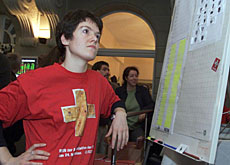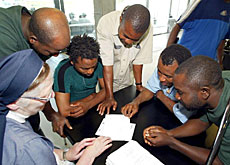Asylum seekers get cash for community work

Zurich's city council is pressing ahead with a controversial pilot project aimed at providing community work for asylum seekers.
Participants in the scheme will receive a small “motivational” payment, even though many are banned from working under Swiss law.
Federal regulations prevent any asylum seeker in Switzerland from working during his or her first three months in the country.
Cantonal regulations in Zurich currently extend that work ban by another three months.
However, under the proposals set out by the council on Wednesday, up to 100 asylum seekers will soon be working in the city’s nursing homes, schools and parks – regardless of how long they have been in Switzerland.
Benefits
Zurich mayor Elmar Ledergerber insists that the project will be of benefit not only to asylum seekers but also to the city as a whole.
He also says that the small amount of “financial motivation” involved – no more than SFr400 ($290) a month – will not see the city council falling foul of its cantonal and federal counterparts.
“We’re talking about a daily bonus of around ten or 12 francs,” points out Ledergerber.
“That isn’t enough to be against the regulations, and it’s certainly not enough to act as an incentive for someone to leave Africa or Afghanistan or wherever, and become an asylum seeker in Switzerland.
“We are already supporting these people financially and this is a chance for them to give something back.
“Cleaning up the city is one area that’s very expensive and if we can do that with asylum seekers, the whole town will feel the benefit and people will recognise the role that the asylum seekers have played.”
Pilot project
The pilot project, which is initially due to run until the end of 2004, is expected to cost SFr1.436 million ($1.04 million).
The city council is asking both the cantonal and national authorities to provide a third of the funding each, but says it will go ahead with the scheme even if those requests are turned down.
The need to provide asylum seekers with opportunities for daily activity was one of ten points put forward by the city council in a manifesto published in January.
The manifesto was itself a direct response to a national initiative, sponsored by the right-wing Swiss People’s Party, aimed at a further tightening up of the restrictions facing asylum seekers.
The November initiative was defeated, but only by a tiny majority of less than 4,000 votes – prompting the People’s Party to declare that their concerns were justified.
Opposition
Unsurprisingly, the party seemed less than impressed on Wednesday by the city council’s latest proposal. Hans Fehr, a parliamentarian representing Zurich, questioned both its logic and its legality.
“For me, the council’s arguments are not truthful,” Fehr insisted. “If you pay someone 400 francs a month, that absolutely is enough for them to send home to Africa or anywhere else and encourage more asylum seekers to enter Switzerland.
“It’s also not legal to make these payments because we have a very clear work ban in place. Besides someone has to pay for it and I am sure that if the canton and the national government say no, the city council will have to stop this project.”
Fehr also expressed concern about the possible effects on Zurich’s unemployment figures, at a time when more than five per cent of Zurich’s workers are currently out of work (compared to 3.9 per cent nationwide).
Anticipating that argument, the organisers of the pilot project insisted they would not be taking any jobs away from Swiss nationals.
“The work we have found for the asylum seekers is work that would simply not get done if it wasn’t for this project, or work that it wouldn’t otherwise be possible to finance,” said project leader Jürg Frey.
Low pay
Zurich asylum centre director Thomas Kunz believes there will be plenty of eager applicants for the positions, despite the low financial rewards.
“We have run other smaller-scale projects in the past,” Kunz told swissinfo, “usually combining work with education. We’ve always had much higher demand for places than we’ve been able to meet and I expect something similar this time.”
Nor does Kunz see any danger of exploitation in the scheme.
“We will be checking out every job and every workplace and collating our experiences to check the suitability of the work on offer,” he said.
“Besides, these jobs are voluntary and the asylum seeker can always leave if he’s not happy. All in all, though, I think this is an arrangement that should keep everyone happy.”
swissinfo, Mark Ledsom in Zurich
A Zurich pilot project will soon provide work for asylum seekers.
The project has a budget of SFr1.4 million, and the city is hoping cantonal and national authorities will contribute two-thirds.
About 100 asylum seekers will receive a “bonus” of up to SFr400 a month, for working in the community’s nursing homes, schools and parks.
It has sparked controversy because federal regulations ban asylum seekers from working.

In compliance with the JTI standards
More: SWI swissinfo.ch certified by the Journalism Trust Initiative












You can find an overview of ongoing debates with our journalists here . Please join us!
If you want to start a conversation about a topic raised in this article or want to report factual errors, email us at english@swissinfo.ch.